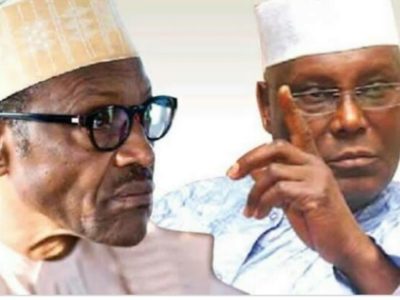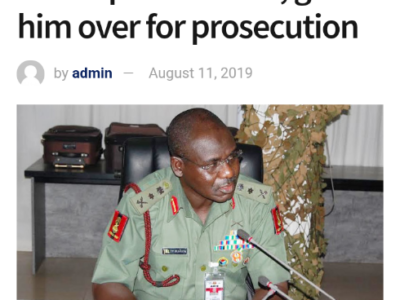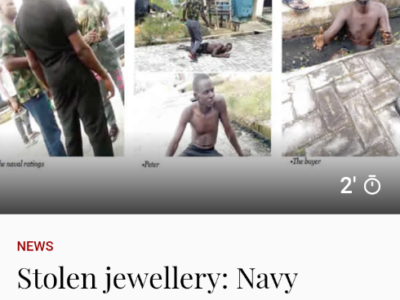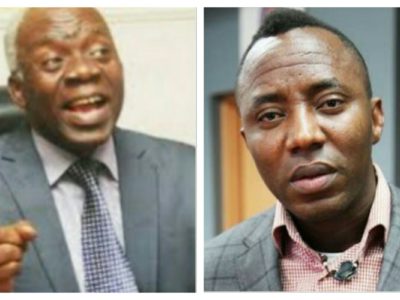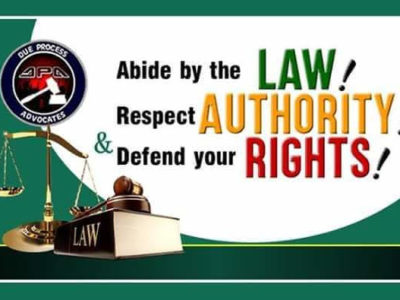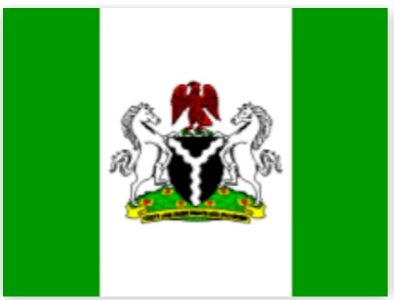A history of abuse of prosecutorial powers against political opponents
Right from the beginning of our republic, the ruling party has used the power of prosecution to oppress the minority. The first case was Awolowo. Even President Shagari deported a Nigerian citizen who opposed him. The man was Alhaji Shugaba. Shagari claimed that Shugaba was no longer a Nigerian, but that he was from Niger instead. So, Shugaba was taken from his house and dumped across the Nigerien border.
Nigerian government abused prosecutorial powers the most under Obasanjo. Obasanjo alone did more than all other Presidents put together. All those impeachments of Governors were all in violation of the constitution. EFCC was massively used as an instrument of political control by Obasanjo. Jonathan made the least use of abusive prosecutorial powers. Apart from James Ibori case, Jonathan did not use this kind of power against political opponents. This shows that of all Nigerian leaders since independence, Jonathan was the least ambitious and the least desperate for power.
Buhari has turned out to exploit this power increasingly. Though he still has nearly 4 years in office, his record of abusive use of prosecutorial power is already high. He has been planning how to use this power against Atiku. DPA Rambo has done significant research which shows that Buhari is going to find an excuse to arrest Atiku and accuse him of a crime. One opportunity that has presented itself is the Revolution-Now issue. This government may soon claim that Atiku sponsored it. It is just a pretext to apply political control over a political opponent. This plan will become necessary if Atiku continues to do well at the election tribunal. If, for instance, Atiku wins at the tribunal, and a new election is called for, Atiku will contest from prison. The recent arrest by the EFCC of Atiku's lawyer and son-in-law has some strategic relevance for that ultimate move.
For a more detailed analysis of the history of abusive prosecutorial power, read full report next week on DPA Rambo.
What about the rest?
A female student in a pubic bus at a military checkpoint was ordered to come down from the bus. The bus was ordered to continue the journey without her. She was then taken to a boot used by the soldiers at that checkpoint and she was gang rapped.
The lady is a brave and courageous woman. So, she did not keep quiet like most victims. She reported the incident. And once it was in the press, the Military was forced to act.
We just got the report that the military has dismissed one of the officers. We are now asking about the rest. The army must go forward and make sure that every officer involved in this heinous crime is punished.
Also, proper investigation should be convicted to find the following:
1) Are there other women raped in similar fashion by these officers? This cannot be the first time this officer is doing this.
2) Have there been other cases involving other officers at that location in similar cases? This officer might just have done what he saw other colleagues do.
Navy orders arrest of its personnel that tortured a man to death, but that’s not enough
It is certainly good news that the Navy has ordered the arrest of its personnel involved in the torture of a civilian guard in a deadly jungle justice incident. The guard died from the torture.
The Command Information Officer, Western Naval Command, Lagos, Commodore Tom Otuji, told Punch correspondent on Saturday that the Force had ordered the arrest of the two men.
But this is not enough. The navy personnel have been involved in many cases of gross human right abuses and atrocities. Why do these continue to happen? It only means that the navy itself has never taken the issue of human rights seriously. They need to have a program for teaching and training their personnel on human rights issues to prevent this sort of incident.
Finally, the police should get involved in this case for the purpose of investigating the civilian who hired the navy personnel to torture the guard.
One highlight on how Falana plans to defend Sowore
I had read it reported in the media. But I finally had the opportunity to listen to what Falana actually said about how he plans to defend Sowore. Falana said: "I do hope they will not charge him; I hope the government will not be stupid enough to charge him with treason. You know why? You know why? He has briefed me. In fairness to the DSS, when he told them yesterday that he would not make a statement without speaking to his lawyer, they asked him who was his lawyer. He said Femi Falana. In fairness to DSS, they gave him a phone to call me. Of course, I knew they were monitoring the phone. But I said to him: I hope they won't charge you. But if they do, some of the people in government will be our witnesses. You know why? You know why? One of them; I won't mention his name, in 2011, one of them asked Nigerians to learn from the Egyptian revolution and be ready for a revolution."
Everybody in the room clapped for Falana when he said that. Of course, this became sensational headline everywhere - "Falana Plans to Make Buhari his First Witness". Yes, Falana was referring to the statement of Candidate Buhari during the campaign for 2011 elections.
Now, let's analyze the above defense plans to try to understand the strategy behind it.
First, the statement Falana attributed to Buhari in 2011 did not call for a revolution. It only asked Nigerians (no specific person) to "study" Egyptian revolution and "prepare" for a revolution. He did not state what exactly they needed to do to "prepare" for revolution. Or whether they are to prepare to cause revolution or to prepare to witness it. Example, it did not tell them to start a protest or riot. Indeed, he could have meant that they should start praying against the anticipated revolution. Also, it did not give them a date when the revolution was to start. So, without telling anybody exactly what to do or the date to start doing that, the statement attributed to Buhari is not the same thing as what Sowore did. Comparing the two is really a big mistake.
Further, when a lawyer calls a witness, he must have a clear and specific objective for calling that witness - either to establish a defense or an alibi - leading to exculpation or to discredit a witness called by the other party. Assuming Buhari goes to court and admits that yes, indeed, he made that statement in 2011, how does that help Sowore to explain his meetings with IPOB leader and plans to use the Shiites to bring the government down? How does that help explain Sowore's call for protest on 5th August 2019 under the slogan "Revolution Now"?
Okay, let us say that Buhari also planned a revolution in 2011 and did exactly everything Sowore did now, how does that help the defence in this case? In a criminal trial, it is not a defense that somebody else who committed the same offense was not prosecuted. It is like a person standing trial for rape telling the court that the victim was also raped 8 years ago and the previous rapist was not prosecuted. The fact that someone else committed the same offense and was not prosecuted will never be an excuse for you to commit that same offense. Indeed, to pursue that line of defense amounts to a confession.
Having said all that, it is clear that Falana will not be allowed to call Buhari as a witness because the law requires a person to state what a witness is coming to testify before he can be called especially when the witness is being subpoenaed against his will. And for the reasons explained above, the court will not agree that the testimony of Buhari will serve any defense purpose.
Also, Femi Falana totally forgot that Presidential immunities will not allow a court to compel the President or even a Governor or Deputy Governor. Anybody that cannot be arrested cannot be compelled because the only way for a court to compel a person is by ordering his arrest. So, how does Falana intend to force Buhari to testify while still in office as President of Nigeria? Or maybe, he wants to delay the trial of Sowore till Buhari leaves office, while Sowore remains in detention.
Finally, Falana will not be able to call witnesses until the prosecution has closed its case and defense opens its own case. So, Falana must wait for up to 2 years before his first move to call Buhari or anyone else as witness.
Even a fresh lawyer just stepping out of law school today knows that Femi Falana is selling a dummy to ignorant and excitable audience. He can't be serious at all. But why such bogus claims? It must be a general belief that the case will eventually blow over and Sowore will be warned and released. But this practice of selling dummies to the people must stop.
Can anyone really plan and carry out a revolution?
The answer is No, and this is probably the best defence Sowore will have. He is being accused of planning that which is impossible. I have been laughing at the various things Nigerians have been writing on the social media in the past one week. I have not come across anyone who seems to realize the fact that you cannot plan and carry out a revolution. Only the gods can do that.
You can plan a coup and overthrow a government, but that is not a revolution. You cannot call for a revolution in the sense of causing it to happen. You can only wish for it. And by the way, all those things you call revolutions are not revolutions. For instance, what happened in Egypt recently is not a revolution. There was no fundamental change. You have Al Sisi doing exactly what Mubarak used to do.
Perhaps, we can make some progress on this by looking at the definition of the term "revolution". Thus: "In political science, a revolution is a fundamental and relatively sudden change in political power and political organization which occurs when the population revolts against the government, typically due to perceived oppression or political incompetence.' - Wikipedia.
It has to be a sudden change, which is fundamental, involving majority of the population revolting. Without going further, you can tell that revolutions are not planned. It involves a chain of events that sweep the society in a tide that often starts without any sense of direction. It is more easy to tell a revolution after the fact than to plan and execute it. This is why in history those leading at the beginning of a revolution are hardly those that end it, that is: those that bring things to order after the revolt. (Castro is an exception).
You can plan a revolt if you have control over any defined group of the population. But a revolt per se doesn't make a revolution. The most recent recognized revolution is the Cuban revolution of 1959.
The Cuban Revolution was an armed revolt conducted by Fidel Castro's revolutionary 26th of July Movement and its allies against the military dictatorship of Cuban President Fulgencio Batista. The revolution began in July 1953 and continued sporadically until the rebels finally ousted Batista on 31 December 1958, replacing his government with a revolutionary socialist state. 26 July 1953 is celebrated in Cuba as the Day of the Revolution. The 26th of July Movement later reformed along communist lines, becoming the Communist Party in October 1965.
You can accuse Sowore of planning various other unlawful things, but not for planning a revolution. He had no contact with the armed forces. He had no capacity to wage any resistance. The last time he tried to mobilize people was when he tried to get their votes and he failed woefully. His hope of getting the IPOB members to team up with the Shiites behind him is a symptom of mental health condition. If he could amass enough people to make any revolt successful in Nigeria, it would have been 10 times easier for him to get them to vote him into office as the President of Nigeria.
I doubt that the word, revolution, will be used in the legal documents to be filed in court, as such will make little sense. So, ironically, the most harmful words used by Sowore is not the word, revolution.
If I ask you to point at historical examples of revolutions that you know, you will easily tell that none is like what Sowore could have contemplated. And this was why I wrote earlier that Sowore probably did not understand the meaning of the term revolution. Otherwise, he wouldn't have used it.
There is a grave danger in hiring a crusader as you lawyer
I look back on the final set of events that led to the execution of Ken Saro Wiwa and others. When you are dealing with a dictator or a repressive regime, you have to be careful how you dare such regime. Having a just cause or a fine argument is never enough. You have to realize that you are dealing with a ruthless and determined regime. Then you make up your mind whether you want to live or to become a martyr.
It is important to remember that if you face martyrdom through a court of law or a tribunal, you are not the person speaking for yourself. It is your lawyer speaking for you. Your lawyer is making decisions about whether you're to live or to die. Make sure you have a lawyer who has no other interest but how to keep you alive. Daring a dictator is dangerous unless you want to be a martyr. The consequence could be tragic.
Ken Saro Wiwa was convicted by a tribunal under General Abacha. The same kangaroo tribunal had on a precious and unrelated case convicted General Zamani Lekwot (Rtd) over the Zango Kataff civil strife that caused death.
Once Lekwot was convicted, he appealed his conviction. Under the relevant decree, appeal lay to the Armed Forces Ruling Council, which was essentially an appeal to the Military . That council considered the appeal and reversed the conviction by the tribunal and reduced the sentence to life imprisonment, and eventually released. Lekwot's life was spared.
When Ken Saro Wiwa was convicted by the same kangaroo tribunal, Wiwa was angry and upset. He was totally obsessed with the righteousness of his cause and his total innocence. Wiwa was an innocent man fighting against a brutal conspiracy against and exploration of his people by the military government and Shell oil company. Wiwa refused to appeal the conviction because he was so sure that the tribunal had no moral right to try him, how much less convict him. And Wiwa was right.
Another thing: Wiwa and General Abacha were well known to each other and were friends. If you recalled, General Abacha served in Port Harcourt for a long time, as the Commanding Officer in charge of the Sixth Division in Port Harcourt. So, he and Wiwa had met on many occasions and became friends. They both shared the same idea of abandoned properties, whereby Igbos were forced to lose their properties in Port Harcourt. Wiwa did not believe that Abacha would approve his conviction or sign his execution.
A number of things were happening around that time. General Obasanjo had just been convicted of plotting a coup against Abacha. They were going to execute Obasanjo. But there was too much pressure from all over the world for the life of Obasanjo to be spared. Andy Young led this pressure from America and the newly elected President Mandela led it from South Africa. Indeed, Mandela sent his deputy, Tarbo Mbeki, and some of his cabinet ministers to Abuja to plead for Obasanjo. Abacha and some of his top Generals were in meeting with the South African delegation till 4:00am. Finally, Abacha gave them his word that General Obasanjo and those convicted with him for the alleged coup would not be executed.
Less than five months after the decision not to execute General Obasanjo, Ken Saro Wiwa's conviction came for confirmation before the Armed Forces Ruling Council. There are a few things to note here. After Wiwa was convicted, his lawyers began to make a lot of public speeches condemning the tribunal. They did walk out of the tribunal a number of times. They spoke of how they would mobilize the international community to prevail on Abacha not to carry out the execution of Wiwa. Also remember that Abiola was in detention at the time. Abacha was faced by a personal sense of insecurity. He was afraid of being perceived to be too weak. For the first time, Nigeria just spared the lives of those convicted of coup. And the issue of Abiola was still hanging over him. He felt a need to appear strong and fearless.
On the day the council was to deliberate on the conviction of Wiwa, Abacha seemed indifferent. He was not particularly keen on executing Wiwa. He allowed the other members of the council to take their turns to speak. Most of them felt that Wiwa was just a stubborn rabble rouser, that there was no need to execute him. But they also commented on the fact that Wiwa was too stubborn and that he refused to appeal his conviction. They also felt irritated by the threats to mobilize the international community being issued by Wiwa's lawyers.
When it was the turn of Naval Chief Mike Akhigbe to speak, he was visibly upset about the perceived arrogance of Wiwa and his lawyers. He spoke for a long time. As if he was reading the mind of Abacha, Ahigbe warned that the government was being perceived to be too weak. He reminded them that they just pardoned coup plotters and that they would be taken for granted if they kept pardoning people who threatened them with international community. He queried why Wiwa kept calling them junters and refused to appeal the conviction.
As Akhigbe spoke, it was clear that Abacha was fully tuned in and was nodding in approval to every word he uttered. Indeed, after Ahigbe had made a strong case for the regime to use Wiwa case to send a strong message that the government was neither weak nor afraid, other Generals who had spoken earlier raised their hands and when given the chance to speak again all shifted toward Ahigbe's tone. That was how it was voted that Wiwa be executed.
By 5:00am when the executioners came to execute Wiwa that day, Wiwa did not believe it. He didn't think it was going to happen. His lawyers said there was going to be international community that would prevent any exceptions.
There is one thing you will notice about those who speak too much about the international community. They are usually people who have never lived for long outside Nigeria. All they know about the international community is what they read in the outdated books or imagined about how the international system works. Nobody is coming to intervene in Nigeria. No international community intervened in Rwanda. During the Nigerian civil war, the Biafrans believed they were going to get international support. But all they got was Red Cross and the Catholic Caritas. The few countries that supported such as France, Garbon, Ivory Coast were only interested in taking Biafran refugees.
As one watches Sowore case and the same type of people speak of what the international community would do or not do, one remembers Ken Saro Wiwa case. Of course, you cannot compare Sowore with Ken Saro Wiwa. That will be an insult to the memory of Wiwa. But the message still holds that only an unwise person dares a government like Buhari's government. It is like standing in front of a moving train because you are convinced it is moving on on the wrong track. I'm not a supporter of Buhari administration. But it will be stupid not to realize that planning a revolution against his government is giving his government an excuse to wiwarize you.

